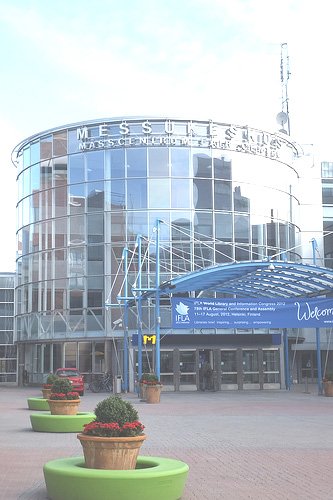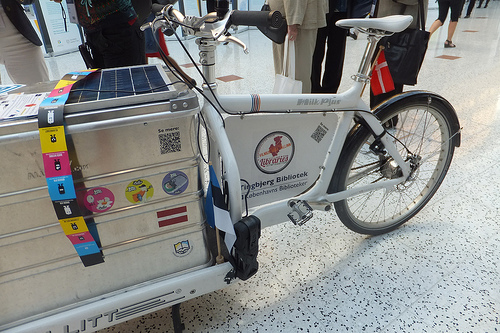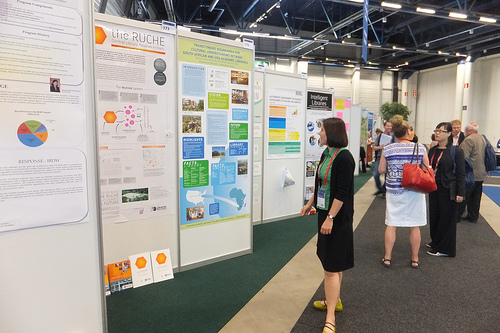IFLA World Library and Information Congress 2012
Marieke Guy reports on the 78th IFLA General Conference and Assembly held in Helsinki, Finland over 11-17 August 2012.
The Sunday newcomers session chaired by Buhle Mbambo-Thata provided us with some insight into the sheer magnitude of IFLA (as most people seem to call it) or the World Library and Information Congress (to give the formal name) [1]. This year’s congress had over 4,200 delegates from 120 different countries, though over a thousand of these were Finnish librarians making the most of the locality of this year’s event. IFLA offers hundreds of session covering all aspects of librarianship, from library buildings, equipment, rare books and manuscripts to legal issues and new trends. “IFLA”, Jennifer Nicholson, the secretary general, explained, “is more than just a conference - it is a place at which a large international organisation does its business.” The International Federation of Library Associations and Institutions (IFLA) [2] is actually the leading international body representing the interests of library and information services and their users. It is the ‘global voice of the library and information profession’. As delegates we were encouraged to attend any open meeting in which we were interested. The emphasis of the event was very much on allowing ourselves to ‘grow as library professionals’.
With so much on offer it is impossible to cover all aspects of the congress and conference, so I’ll focus on those that I personally found to be the most interesting or innovative.
Plenary: The Memory of the Entire World
The opening keynote on the first official day of the conference was given by Peter von Bagh, a famous Finnish film historian. Von Bagh has authored more than 30 books on film, history and popular arts and is also a film director with a speciality in compilation films. His talk was framed around historical film clips. He began by looking at a French adaption of Don Quixote released in 1933, the same year in which books were being burnt in Nazi Germany, using it to offer show the role of libraries in learning. Von Bagh explained that language is very important in Finland because “language is our home” despite Finns being described by Brecht as a ‘People who can keep silent in 2 languages’. Other clips, such as those from Von Bagh’s film Helsinki Forever, gave some insight into Finish literature and culture, though the stereotypes offered (Finns as hard-drinking, wife-beating, non-communicative television watchers) weren’t particularly in line with a vision of current Finland. Towards the end of his talk Von Bagh showed a clip from what he believed to be the most famous film about libraries: Toute la mémoire du monde – The Memory of the Entire World, a documentary by Alain Resnais. The film analyses the architecture, processes and contents of the Bibliothèque nationale de France. It argues that knowledge should be subject to preservation for future reference.

Helsinki Conference Centre
Although Von Bagh’s homage to libraries and his emphasis on their role in preserving our past was laudable, some of his thinking was probably not ideal for an opening keynote at a current library conference. Especially not at a time when librarians continue to redefine their role in an never-ending attempt to ‘be relevant’. He speculated that thinking and memory would both atrophy when students relied so much on technology, he seemed to depict the past as good and the future as bad. His view of mobile phones (probably Finland’s main industry) was that they contributed to small talk but not much else. Interesting that in a later session on the Google Generation, Lili Luo from the School of Library and Information Science, San José State University, California, USA pointed out that 18-24 year olds exchange an average of 109.5 text messages a day. Could such dedication be ignored? The Twitter stream commented: ‘puzzling defeatism and nostalgia from Von Bagh - thought this was a forward-looking profession?’
Track: Cloud Computing
The cloud computing track led by the Committee on Copyright and Other Legal Matters (CLM) comprised three plenary talks. It looked at the impact of cloud computing on privacy, jurisdiction, security, lawful access, ownership and permanence of data.
Clifford Lynch of the Coalition for Networked Information (CNI), Washington DC, USA gave a clear introduction to storage clouds, computing clouds and their implications for libraries. He began by pointing out that cloud computing is not a new idea and began in the 1960s with notions of utility computing. Lynch defined two types of cloud: public and private, which are used in three ways: Clouds that are about storage, clouds that are about computing, and clouds that are about applications as a service.
One of the main benefits for cultural heritage institutions are that to some degree cloud computing displaces responsibility because it puts the onus on the vendor to worry about capacity and computing power. Cloud computing providers can operate on a scale that is beyond most organisations. Lynch then covered aspects such as pricing, where data are stored, misuse of data, etc and how libraries should be using the information available to help them make informed choices.
Christine Runnegar from the Internet Society, Geneva, Switzerland then gave a really interesting talk entitled Privacy on the Internet: Looking to the future. Runnegar explained how data that travel round the Internet can help those with knowledge to build pictures of individual things: interests, locations, relationships, genetics, sound and voice, video and activity, time. We all leave digital footprints which reveal who we are and what we have done. This can allow others to make calculated guesses about our preferences.
Her talk covered areas of concern such as the growing use of HTTPS, the communications protocol for secure connections. Some browsers (Google and Chrome) use them by default but in reality HTTPS is only 12% secure! Runnegar gave some interesting examples of possible misuse of data. For example a travel company had recently started showing more expensive rooms to Mac users than PC users! She went on to explain how the Internet Society defines online privacy: ‘consensual sharing of personal data within a specific context with an expectation of scope’. Runnegar ended by saying that the proliferation and persistence of data, fuelled by cheap storage, will lead to new ways of working such as linked data sets, better tracking of online journeys, more correlation and aggregation of data and automated intelligence.
Patrick D. Flaherty from the Litigation Department, Torys LLP, Toronto, Canada gave further insights into jurisdiction over privacy and data protection in the cloud. At the start of his talk he explained that he didn’t want jurisdiction issues to stop anyone from harnessing the power of cloud, but that an awareness of concerns could prevent problems further down the line. The main existing as well as emerging concerns about privacy posed by the cloud emanated from loss of control over data when transferred to a third party. This left potential for misuse of data, lack of compliance with retention obligations and security breaches. The key issue was that no one set of national laws applied to the exclusion of all others and we needed to know what local law determined as our obligations and rights. This allowed us to know and control where and to whom our data will go (ie transfer, storage and accessibility) and understand any differences with our own law or policy. Flaherty emphasised the importance of contracts and offered a check-list for libraries and archives when making decisions about the cloud.

The ultimate mobile library
Plenary: Knotworking
The Tuesday plenary entitled Towards Knotworking: Designing a new concept of work in an academic library was given by Professor Yrjö Engeström, Director of the Center for Research on Activity, Development and Learning (CRADLE) at the Institute of Behavioural Sciences of the University of Helsinki. Engeström began with gloomy warning of academic libraries facing a critical situation where researchers are less visible in libraries and librarians are failing to deliver services. He asked who has the expertise to serve researchers? Are there enough of us to offer them customised services? Using a process called the Change Laboratory, academic librarians in Helsinki have become involved in research activities. Knotworking is characterised by collaborative performance between otherwise loosely connected actors and activity systems. The idea is to gather experts for a short period of time to solve a specific problem in the academic library. It is clear that librarians cannot be committed to a single research group because there are not enough librarians to go round and the work is very demanding. So at Helsinki University they have created a new model of customised and standardised services, which are currently at the implementation stage. For example, the librarians have created a quick reference guide for one research group on how to handle research data management. Research data management is something with which librarians have only recently become involved and they still have much to learn. The system of knotworking was bringing research groups back to the library and generating new demand for services.
Track: Data Curation
Following on from the idea of integrating research further with research support services, the Science and Technology Libraries track on the role of libraries in data curation, access and preservation consisted of six talks from nine speakers. The opening chair pointed out that over 30 papers had been submitted for this strand and data curation was clearly an important area for librarians right now.
Achim Osswald from Cologne University of Applied Sciences, Institute of Information Science, Cologne, Germany gave a presentation entitled The role of libraries in curation and preservation of research data in Germany: findings of a survey. He highlighted a couple of recent reports including the report Riding the Wave, NSB 2005, OECD 2007 and the High-level Expert Group 2010. All emphasised the relevance of research data to current academic working. Osswald asked what qualifications and skills were needed by librarians to work in this area? He identified metadata, persistent identifiers, citation. Osswald mentioned the DigCurV Project which established a framework for vocational training in digital curation. He also pointed out that major revisions in LIS curricula were only made every 5-6 years and that they did not cover skills and qualifications for data curation.
Carol Tenopir, University of Tennessee, Knoxville, TN, USA from the DataOne Project gave her presentation entitled Academic Librarians and Data Research Services: Preparation and attitudes. She described a survey sent to 948 librarians at 111 ARL libraries, most of which were engaging with researchers. 223 responded. While many who worked in Research Data Management (RDM) services felt that they had the necessary skills and training, those who worked in other areas felt unprepared for the challenges ahead. It was clear that most libraries were very much in a transition phase.
Lynn Copeland from Simon Fraser University, Burnaby, British Columbia, Canada and Brent Roe, Canadian Association of Research Libraries, Ottawa, Ontario, Canada gave a joint presentation on research data initiatives in Canada. While others confessed to being new to this area, Canadian libraries have been providing research data services since the 1970s. However these services were still not happening on a national scale and there were many funding gaps. Copeland pointed out the Canadian open government data initiative which has made over 2,000 data sets available.
The talk Leading from the Library: Data management initiatives at the University of Northampton [3] was given by my colleagues Miggie Pickton, University of Northampton, Sarah Jones, Digital Curation Centre at HATII, University of Glasgow and myself. Our presentation looked at activities being carried out at Northampton as part of the UK Digital Curation Centre Institutional Engagement work. It considered the role of librarians in research data management tasks. The library was currently leading on most of the DCC engagements. Possible reasons for this were that they often ran publication repositories, had good relationships with researchers and possessed a highly relevant skill set.
The final two presentations offered further examples of libraries leading the way. Reinhard Altenhöner from the Deutsche Nationalbibliothek offered practical insights from the DFG project DP4lib (Digital Preservation for Libraries) where the library is acting as a service-broker for digital data curation. Susan Reilly from LIBER (Ligue des Bibliothèques Européennes de Recherche/Association of European Research Libraries), The Hague, Netherlands explained how LIBER was making the case for research libraries. Rielly offered the Opportunities for Data Exchange (ODE) Project as an exemplar project, which shared emerging best practice. ODE was bridging the gap as ‘libraries don’t always speak the language of the researcher’.
Exhibition and Posters
One aspect of the conference that I really enjoyed was the exhibition and posters [4]. Apparently there were 196 poster presentations in the exhibition. This impressive and interesting collection gave a quick glimpse of library initiatives taking place all round the world.
A couple that have stuck in my mind are :
- The Finnish libraries who have a dog on site for children to read to – apparently this improves reading confidence
- The Japanese libraries who are working together to support recovery after the Great East Japan Earthquake and Tsunami of 2011
- The Serbian library which is trying to encourage the integration of disabled people and is helping children to use sign language in the library
- The Ugandan library which is using a new library building to empower the low-income academic community.
The exhibition offered opportunities to look at various library products out there, to hear more talks and to find a few freebies to take home. My personal favourite was the ‘tree in your pocket’ – a miniature tree that you have to look after by watering once a month! Other highlights were the Tingbjerg Bibliotek mobile library bike from Copenhagen, Denmark and the stand from Axiell (sponsors of the lanyards) where an artist aimed to incorporate delegates’ ideas in a wall mural. This was meant to relate to their quote for the week ‘to expect the unexpected shows a thoroughly modern intellect’ (– Oscar Wilde).

The author reviews conference posters
Conclusion
Unfortunately due to other commitments I didn’t get to stay at IFLA 2012 for the whole week. There were so many more sessions that I would have liked to attend: such as the session on libraries and environmental sustainability, and the session on disaster planning and recovery for digital libraries. But as is sometimes the case, there was just too much to see and so little time in which to do it. The IFLA congress 2012 offered an amazing opportunity for librarians to meet peers from all around the globe and feel proud of being part of a profession that offers so much to so many. So to end with a few words from Ingrid Parent, President of IFLA, during her opening keynote. Parent suggested that we ‘think globally, act locally’. It’s a well-known expression that commends us to consider the impact of our activities on others. When used in application to libraries and librarians it makes perfect sense. Librarians know that libraries offer a refuge for many and such an outlook encourages collaboration and a forward-thinking approach.
The papers and slides from IFLA are available from the main Web site [1]. There is also an IFLA Facebook page [5] and an IFLA Vimeo site [6].
The World Library and Information Congress 2013 will be held in Singapore from 17 – 23 August [7].
References
- IFLA World Library and Information Congress 2012 http://conference.ifla.org/ifla78
- The International Federation of Library Associations and Institutions (IFLA) http://www.ifla.org
- Guy, M., Jones, S. and Pickton, M., 2012. Leading from the library: data management initiatives at the University of Northampton. In: IFLA World Library and Information Congress. Helsinki: IFLA. http://opus.bath.ac.uk/31283/
- IFLA Poster session and Exhibition http://conference.ifla.org/ifla78/poster-sessions
- IFLA Facebook page https://www.facebook.com/wlic2012
- IFLA Vimeo site http://vimeo.com/ifla
- IFLA World Library and Information Congress 2013 http://conference.ifla.org/ifla79
Author Details
Marieke Guy
Research Officer
UKOLN
University of Bath
Email: m.guy@ukoln.ac.uk
Web site: http://www.ukoln.ac.uk
Marieke Guy is a research officer for UKOLN. She currently works as an Institutional Support Officer for the Digital Curation Centre, working towards raising awareness and building capacity for institutional research data management. Marieke is the remote worker champion at UKOLN. In this she works towards ensuring that the UKOLN remote workers are represented within the organisation.
